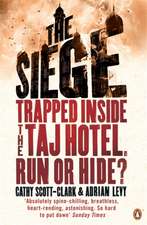Al-Qaeda's Post-9/11 Devolution: The Failed Jihadist Struggle Against the Near and Far Enemy: New Directions in Terrorism Studies
Autor Dr. Anthony Celsoen Limba Engleză Paperback – 21 oct 2015
| Toate formatele și edițiile | Preț | Express |
|---|---|---|
| Paperback (1) | 257.03 lei 6-8 săpt. | |
| Bloomsbury Publishing – 21 oct 2015 | 257.03 lei 6-8 săpt. | |
| Hardback (1) | 774.20 lei 6-8 săpt. | |
| Bloomsbury Publishing – 23 apr 2014 | 774.20 lei 6-8 săpt. |
Preț: 257.03 lei
Preț vechi: 330.95 lei
-22% Nou
Puncte Express: 386
Preț estimativ în valută:
49.19€ • 53.41$ • 41.32£
49.19€ • 53.41$ • 41.32£
Carte tipărită la comandă
Livrare economică 22 aprilie-06 mai
Preluare comenzi: 021 569.72.76
Specificații
ISBN-13: 9781501312441
ISBN-10: 1501312448
Pagini: 256
Dimensiuni: 152 x 229 x 25 mm
Greutate: 0.34 kg
Editura: Bloomsbury Publishing
Colecția Bloomsbury Academic
Seria New Directions in Terrorism Studies
Locul publicării:New York, United States
ISBN-10: 1501312448
Pagini: 256
Dimensiuni: 152 x 229 x 25 mm
Greutate: 0.34 kg
Editura: Bloomsbury Publishing
Colecția Bloomsbury Academic
Seria New Directions in Terrorism Studies
Locul publicării:New York, United States
Caracteristici
Assesses the future of the jihadist struggle against the Muslim government and the West
Notă biografică
Dr. Anthony Celso is an Associate Professor with Department for Security Studies at Angelo State University, USA. He is also the author of African Security Problems in the 21st Century: The Failed State Revisited to be published in the Winter of 2013.
Cuprins
Introduction: Al-Qaeda's Post 9-11 Devolution and its Diffuse Network of Associates, Affiliates, Insurgents and "Homegrown" TerroristsChapter One: Al-Qaeda's Jihadist World ViewChapter Two: Al-Qaeda's Formation and its Far Enemy StrategyChapter Three: Al-Qaeda's Post 9-11 Strategy and Organizational DevolutionChapter Four: Al-Qaeda's Role in the Madrid and London BombingsChapter Five: Zarqawi: Al-Qaeda's Tragic Anti-Hero and the Destructive Role of the Iraqi JihadChapter Six: Al-Qaeda's Affiliated and Insurgent Groups in Somalia, Yemen and the MaghrebChapter Seven: West Africa: The Latest Jihadist WarChapter Eight: The Role of Al-Qaeda Affiliated and Homegrown Terrorists in Post 9-11 Plots and Attacks against the United StatesChapter Nine: An End to Al-Qaeda? : Bin Laden's Death and the Arab SpringBibliographyIndex
Recenzii
Dr. Celso makes a substantial contribution to the scholarship with this new work. Consistently and accurately researched, and articulately written, this book will make important and ground breaking reading for policy makers and academics alike. This book should be required reading for anyone who truly wishes to understand the Al-Qaeda threat.
A superb work that takes the reader far beyond the traditional and inaccurate representations of Al-Qaeda and its affiliates as existential threats to the global community and in particular the West. Using a wealth of primary and secondary sources, Celso illustrates how weak these extremist organizations are, how harried they are by their pursuers, and why concerns about the threats they pose, if by no means unfounded, are in general overblown. The devolution of Al-Qaeda into weaker affiliate groups with less capable leaders and major impediments to funding, training, and the execution of attacks, is clear throughout the narrative. Celso explains with great skill how the 'hunters' have become the 'hunted,' and the degree to which Al-Qaeda has become, in the author's words, 'a badly crippled and failed organization.' Will be profitably read by military, homeland-security, and law-enforcement personnel as well as scholars and any serious students of terrorism.
Anthony Celso has written an exceptionally important book on the "devolution" of Al-Qaeda after 9/11. While some pundits still believe that Al-Qaeda remains a viable terrorist organization, Celso's research has revealed the opposite. He shows in clear terms that Al-Qaeda's central message of jihad is failing to resonate with affiliates and associated organizations and that fragmentation has caused their 'vexation and exhaustion' campaign to founder. While Al-Qaeda still has the capacity to cause serious trouble, Celso shows that they are in organization in decline and this is good news for everyone.
Dr. Celso's book takes its readers into the fascinating journey of exploring the changing nature of global terrorist networks, as a separately acknowledged phenomenon. Constantly mutating nature of Al-Qaeda, the flagship of modern-day trans-border terror, poses considerable challenges to the defense and security communities worldwide. Dr. Celso did a superb job in bringing together in a comprehensive way all the functional and regional transformations of Al-Qaeda and its implications for the counter-terrorist efforts across the globe. The book is a great read for all those interested in knowing what the 'new' terrorism is; what threats it presents to the civilized world and how to tackle it.
A superb work that takes the reader far beyond the traditional and inaccurate representations of Al-Qaeda and its affiliates as existential threats to the global community and in particular the West. Using a wealth of primary and secondary sources, Celso illustrates how weak these extremist organizations are, how harried they are by their pursuers, and why concerns about the threats they pose, if by no means unfounded, are in general overblown. The devolution of Al-Qaeda into weaker affiliate groups with less capable leaders and major impediments to funding, training, and the execution of attacks, is clear throughout the narrative. Celso explains with great skill how the 'hunters' have become the 'hunted,' and the degree to which Al-Qaeda has become, in the author's words, 'a badly crippled and failed organization.' Will be profitably read by military, homeland-security, and law-enforcement personnel as well as scholars and any serious students of terrorism.
Anthony Celso has written an exceptionally important book on the "devolution" of Al-Qaeda after 9/11. While some pundits still believe that Al-Qaeda remains a viable terrorist organization, Celso's research has revealed the opposite. He shows in clear terms that Al-Qaeda's central message of jihad is failing to resonate with affiliates and associated organizations and that fragmentation has caused their 'vexation and exhaustion' campaign to founder. While Al-Qaeda still has the capacity to cause serious trouble, Celso shows that they are in organization in decline and this is good news for everyone.
Dr. Celso's book takes its readers into the fascinating journey of exploring the changing nature of global terrorist networks, as a separately acknowledged phenomenon. Constantly mutating nature of Al-Qaeda, the flagship of modern-day trans-border terror, poses considerable challenges to the defense and security communities worldwide. Dr. Celso did a superb job in bringing together in a comprehensive way all the functional and regional transformations of Al-Qaeda and its implications for the counter-terrorist efforts across the globe. The book is a great read for all those interested in knowing what the 'new' terrorism is; what threats it presents to the civilized world and how to tackle it.


























